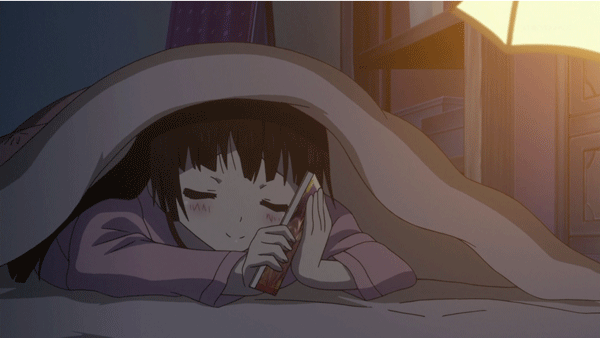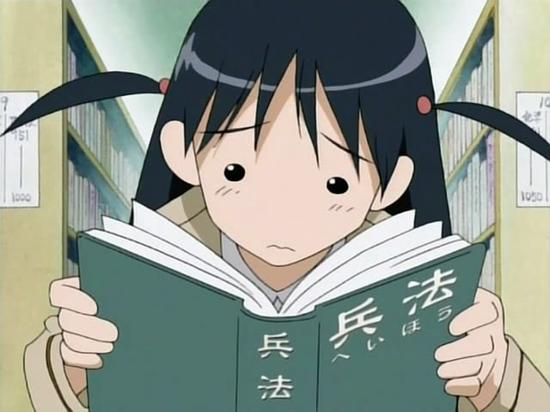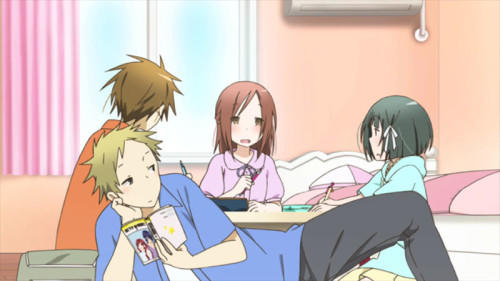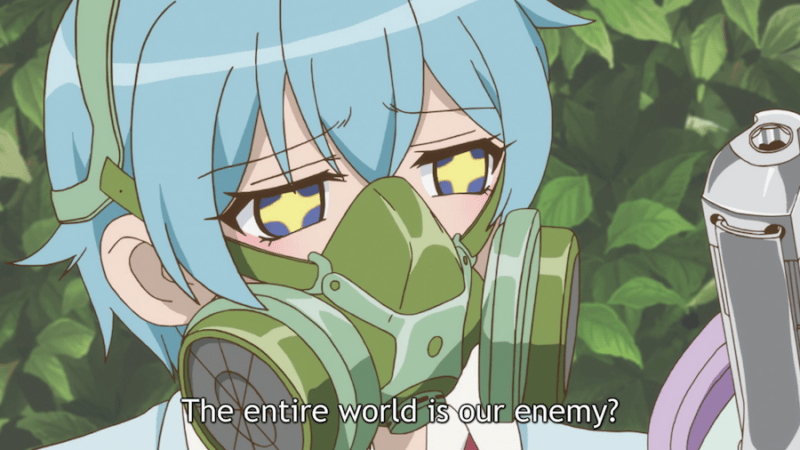 Stories shape how we view the world and how we treat other people. While I’ve gotten into anime too late in life for it to really shape my morality, it has changed how I think about some topics. In this article, I will pull from Zen and Christianity (and indirectly from Judaism) in addition to anime for my illustrations. Why just those two? Because that is what I am familiar with. They are my practice. While I’ve studied Islam and read the Koran, I don’t have enough knowledge to comment on how Islam teaches the morals we will cover. Zen can be found throughout anime because of how Buddhism and Shinto have mixed in Japanese culture. Because JP is a blog, I can’t write in depth about either Zen or Christianity. That would take a book! (No, I don’t have one in the works on this topic. At least, not yet.) So in some virtues, I will have to simplify some of the explanations. I’ll do my best to keep to the core of it and also not make it too boring.
Stories shape how we view the world and how we treat other people. While I’ve gotten into anime too late in life for it to really shape my morality, it has changed how I think about some topics. In this article, I will pull from Zen and Christianity (and indirectly from Judaism) in addition to anime for my illustrations. Why just those two? Because that is what I am familiar with. They are my practice. While I’ve studied Islam and read the Koran, I don’t have enough knowledge to comment on how Islam teaches the morals we will cover. Zen can be found throughout anime because of how Buddhism and Shinto have mixed in Japanese culture. Because JP is a blog, I can’t write in depth about either Zen or Christianity. That would take a book! (No, I don’t have one in the works on this topic. At least, not yet.) So in some virtues, I will have to simplify some of the explanations. I’ll do my best to keep to the core of it and also not make it too boring.
Although some would argue they already have the stories necessary to teach morality–the teachings of Buddha and Jesus for example–anime provides accessibility these stories often lack. Entertainment helps messages sink in and help with remembering them. For kids, Naruto inspires more than the usual depiction of a stodgy, bearded Jewish man (I don’t see Jesus as stodgy, far from it, but that is one of the traditional depictions). We might as well understand this appeal and use it.
Bleach contains many virtues such as loyalty, dedication, and community, but let’s look at the core moral found throughout Bleach: you don’t need a reason to help someone. I am going to assume you are familiar with the anime, if not you can read a few of our reviews. While Bleach has fallen in popularity, it still appeals to many people. A simple search on Google shows how fans are still making fan art and fan fiction.
The Nature of Suffering
 Throughout Bleach, Ichigo and friends rush to help people in need. The need to protect people, not just family members and friends, drives the story. As Ichigo states:
Throughout Bleach, Ichigo and friends rush to help people in need. The need to protect people, not just family members and friends, drives the story. As Ichigo states:
I’m not superman, so I can’t say anything big like I’ll protect everyone on earth. I’m not a modest guy who will say it’s enough if I can protect as many people as my two hands can handle either. I want to protect a mountain-load of people.
But what does it mean to protect people? Sure, you work to keep them from being hurt, but it also extends to protecting them from suffering in general. The urge to avoid suffering and help others do the same comes naturally. Buddhism enshrines this idea in the Four Noble Truths: suffering hurts, suffering comes from clinging to things, suffering ends when we stop clinging, there is a way to stop clinging to things. The Four Noble Truths state suffering comes from how we view reality. Our expectations can’t be met by reality, therefore we hurt. If I would drop my favorite teacup–the one my girlfriend bought me for Christmas–and break it, my expectation that I will always have it would make me hurt. This is clinging.
In a larger sense, suffering comes from expectations driving people to hurt each other. For example, religious fundamentalism has a certain set of demands (expectations) that adherents force upon others. In most cases, the adherents can’t even keep the demands! But these shape how they view the world and creates suffering for both themselves and those they force. Christianity, Buddhism, Islam are all guilty of this at one time or another.
The Drive to Help
Okay, let’s come get back to ground level. It’s natural to want to take away a loved one’s pain. It’s a virtue to want to take away a neighbor’s and an enemy’s pain. Bleach teaches this virtue is natural to being human. As Ichigo puts it:
I ain’t such a saint that I can promise to risk my life for strangers. Neither am I scum enough to sit quietly by while people are getting hurt before my eyes.
Normal people don’t go about seeking situations to risk their lives. However, good people also don’t stand aside when someone is getting hurt. Jesus spoke about this in the story of the Good Samaritan. Here’s the story, to refresh your memory (Luke 10:25-37 ESV):
And behold, a lawyer stood up to put him to the test, saying, “Teacher, what shall I do to inherit eternal life?”
He said to him, “What is written in the Law? How do you read it?”
And he answered, “You shall love the Lord your God with all your heart and with all your soul and with all your strength and with all your mind, and your neighbor as yourself.” And he said to him, “You have answered correctly; do this, and you will live.”
But he, desiring to justify himself, said to Jesus, “And who is my neighbor?”
Jesus replied, “A man was going down from Jerusalem to Jericho, and he fell among robbers, who stripped him and beat him and departed, leaving him half dead. Now by chance a priest was going down that road, and when he saw him he passed by on the other side. So likewise a Levite, when he came to the place and saw him, passed by on the other side. But a Samaritan, as he journeyed, came to where he was, and when he saw him, he had compassion. He went to him and bound up his wounds, pouring on oil and wine. Then he set him on his own animal and brought him to an inn and took care of him. And the next day he took out two denariiand gave them to the innkeeper, saying, ‘Take care of him, and whatever more you spend, I will repay you when I come back.’ Which of these three, do you think, proved to be a neighbor to the man who fell among the robbers?”
He said, “The one who showed him mercy.”
And Jesus said to him, “You go, and do likewise.”
Let’s look at this story briefly. The people who avoided the beaten man were religious people: a priest and a Levite. Levites assisted priests in worship. As such, you’d think these men would stop to help someone in need. However, according to Jewish Law, touching a corpse would make them ritually dirty (Numbers 19:11). So to avoid this they passed by without checking on the poor man. Samaritans are a branch of Judaism that only accepts its own ancient version of the Pentateuch, or first 5 books of the Hebrew Bible. Without regard to his ritual purity, the Samaritan stops and helps the man. For the Samaritan, there wasn’t any hesitation toward helping the poor sod.
For Ichigo, what the Samaritan did is a natural action. The Samaritan didn’t go out looking for people to save, but he also couldn’t turn a blind eye. The fact we have these stories points to how we don’t follow this virtue. Protecting people underpins much of shonen, and it is equated with strength. In Ichigo’s case, it drives him to seek power. He wants to protect people from suffering. It takes inner strength to overcome selfishness and seek to help people. The greatest strength comes from when you realize you can’t protect everyone and the cost compassion demands of you:
Unless I grip the sword, I cannot protect you. While gripping the sword, I cannot embrace you.
Sometimes a person doesn’t need protection. Sometimes they need a listening ear and a hug. These moments of frustration test our fiber. Some enemies can’t be cut. The hardest moments come when the sword needs to be put down.
You Don’t Need a Reason to Help Someone
 Throughout Bleach, Ichigo doesn’t need a reason to help someone. He simply does. In Buddhism, some people vow to become bodhisattvas–beings who are reborn until all living things escape suffering–just because they want to protect people from suffering. The Good Samaritan doesn’t ask anything of the man. He simply helps and goes on his way. We don’t need a reason to help other people. Of course, you could argue being human is reason enough. This virtue forms the core philosophy of Bleach and drives Ichigo throughout the story. He will go out of his way to protect friends and family. But he doesn’t go out of his way to help others. He doesn’t fly around like Superman to help all those he sees. In this, Ichigo is quite human. But when faced with suffering, he naturally seeks to help. This too is human.
Throughout Bleach, Ichigo doesn’t need a reason to help someone. He simply does. In Buddhism, some people vow to become bodhisattvas–beings who are reborn until all living things escape suffering–just because they want to protect people from suffering. The Good Samaritan doesn’t ask anything of the man. He simply helps and goes on his way. We don’t need a reason to help other people. Of course, you could argue being human is reason enough. This virtue forms the core philosophy of Bleach and drives Ichigo throughout the story. He will go out of his way to protect friends and family. But he doesn’t go out of his way to help others. He doesn’t fly around like Superman to help all those he sees. In this, Ichigo is quite human. But when faced with suffering, he naturally seeks to help. This too is human.
Anime, like all stories, affect us. They shape how we view the world even though they are fiction. The dialogue we surround ourselves with everyday becomes our internal dialogue. While I write often about anime’s problems–fan-service, incest, harems, and the like–anime has many stand out messages. In fact, most shonen and shojo stories contain good messages. I’ve been beating up on harem stories, but many have a good heart underneath the antics and objectification of women (although objectification should never be overlooked). Anime like Pokemon prove time and again that the medium on the whole is better than the direction American TV (even children’s shows) has gone in terms of moral lessons. Perhaps I’m being biased and a prude, but despite anime’s problems I find it far more watchable than shows like Game of Thrones (I disliked the books). It’s possible to tell a gritty and dark story without falling into smut (Oops, there’s my prudishness again!).
In any case, helping people involves more than giving money. In fact, offering money to those in need can be the worst course of action. Ichigo and the Samaritan get personally involved. I’ll admit that I struggle with this virtue. I am standoffish and guard my personal time jealously. I have turned away from strangers in need. I’m present for those close to me, but I struggle with personally helping strangers. Virtues take time and work to cultivate. After all, it takes time for Ichigo to develop the power he needed to protect people. Striving matters.







“You don’t need a reason to help people” is a quote from Zidane (Final Fantasy IX) 😀
For those who have depression or having some severe disabilities, some don’t want to be pitied all the time. I mean, for me, all I want is for someone to say “I’m sorry to hear that.” or “I’m still your friend.”
There’s a notable passage in BLEACH (which I wrote about) where in the beginning (during the Grand Fisher story), Ichigo asks Rukia if she wanted to know the full story behind his mother’s death. Rukia said that she had no right to say anything because she doesn’t have a clue on how to respond.
Rukia then tells Ichigo that she’ll wait for him to say something and by then, she’ll listen. This scene stood out to me because I think we’re so stuck in giving advice because we want to help and solve problems. It’s almost like a weird sense of loss aversion to people.
I had forgotten Zidane said that, but maybe my subconscious hadn’t?
Ichigo strikes a good balance between sympathy and leaving people be. Often, sitting and listening help the most. Bleach has its problems, but it also had some good moments and points, like the one you describe.Meddling is different from wanting to help people. Sometimes “help” enables damaging behavior. Standing back and letting consequences play out can be the best way to help.